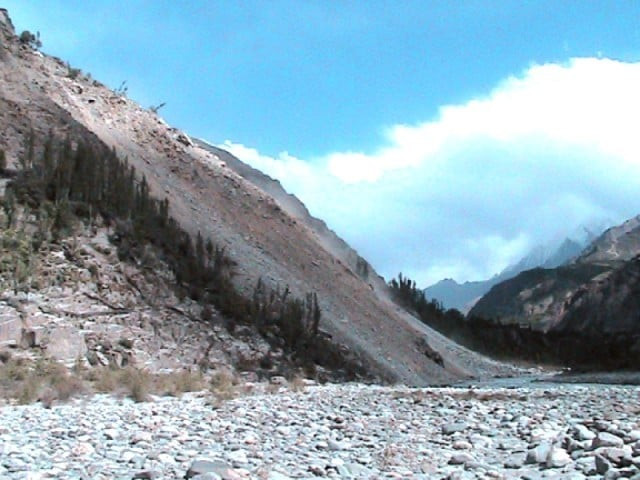Unusual patterns: Climate change behind weather anomalies: PMD
Warm weather likely on eid; heavy showers trigger landslides in Gilgit

Warm weather likely on eid; heavy showers trigger landslides in Gilgit. PHOTO: SHABBIR MIR/EXPRESS
In Punjab also, rainfall in the catchment areas of Jehlum, Chenab, Ravi and Sutlej rivers has been recorded over 200 millimetres in the past three days.
Pakistan Meteorological Department (PMD) Director General Dr Ghulam Rasul said different parts of the country were experiencing weather conditions unusual for this time of the year.
“Summer is just coming to an end. Though winter season has not yet started in the country, mountains adjacent to Kalam in Swat Valley have already received the first snowfall which is very rare in Pakistan,” he said.
These areas receive usually the first snowfall either at the end of October or during the first week of November. “Even autumn has not started yet then how can we call this snowfall as the first one of the winter season,” he wondered.
Rasul said there were chances the mercury might rise to the 30s after the snowfall in Swat. “It has become difficult to predict weather patterns due to these uncertain trends under the influence of climate change,” he added.
Such weather variations, he said, are mostly caused when tropical air mass and temperate air mass mix or, simply put, the interaction of hot and cold air systems.
But the PMD official ruled out the possibility of any more floods that were feared after heavy downpours in Punjab. “Pakistan is no more under the threat of flooding for which alerts were issued a few days ago,” he said. “The rain did not cause flood as it was of low intensity with a longer duration.”
Landslides
In Gilgit, however, heavy showers triggered landslides, blocking traffic on the Karakoram Highway, and also between Gilgit and Skardu. Authorities were able to clear the roads in eight hours.
Rain and snow lashed Gilgit for over 24 hours, lowering the temperature considerably, heralding dawn of winters in the mountainous region.
A man was killed and three others sustained injuries as the vehicles they were travelling in were hit by a landslide near Chilas town in Diamer district. The injured persons were in critical condition, said Diamer DC Usman Ahmed.
Another 25 men, mostly employees of the forest department, got stuck in Deosai Plains after heavy snowfall cut off the world’s highest plateau from the rest of the region.
The PMD said the temperature in the area had plummeted to 5 degrees Celsius.
“This is the beginning of winters,” said Majeed, a resident of Skardu. “If rains continue, we will have to brace for an unusually early and prolonged winter, which otherwise starts from October every year.”
Published in The Express Tribune, September 25th, 2015.



















COMMENTS
Comments are moderated and generally will be posted if they are on-topic and not abusive.
For more information, please see our Comments FAQ